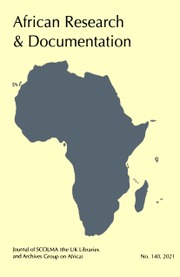No CrossRef data available.
Article contents
Library-To-Library and Librarian-Academic Partnerships: The University of Malawi, The University of Nigeria, Nsukka, and Michigan State University
Published online by Cambridge University Press: 25 April 2022
Extract
University partnerships are a growing focus of African Studies programmes, often underpinning much project rhetoric. Yet, the vagaries of funding and administration can render projects ineffective or less effective, projects that in any case often neglect libraries. This can be a fatal flaw in project planning because libraries in the North tend to form one of the, if not the, major nerve centres of a university; never more so than today, when the physical library ‘neurons’ now comprise not just books and journals but a mass of hardware and software. Some administrators make the mistake of imagining ‘the library’ only in terms of bricks and mortar, and neglect the crucial role of libraries and librarians in identifying, acquiring, classifying and making accessible a wide range of important information resources and related services. In most African countries, neglect of libraries due to limited resources and sometimes policy has had a baneful impact. Therefore, university development projects or partnerships on Africa that neglect libraries and information services do so at their own peril.
- Type
- Articles
- Information
- Copyright
- Copyright © International African Institute 2010
Footnotes
Paper to European Librarians in African Studies (ELIAS) Conference, British Library, June 2010.
References
Notes
2 For some background, see Joel Samoff and Bidemi Carrol, The Promise of Partnership and Continuities of Dependence: External Support to Higher Education in Africa, Paper prepared for presentation at the 45th Annual Meeting of the African Studies Association, Washington, 5-8 December 2002 (pp. 46-47, 109-110 deal with MSU), http://rci.rutgers.edu/∼callasa/ISBC_Partnership_ASA02.pdf.
4 Peter Limb, ‘Ethical dilemmas facing Africanists today: the African “Document Drain” and its solutions?’, ARD 89 2002 pp. 3-18; ‘Accessing African archives, libraries and journals: partnerships, ethics & equity in the 21st century’ ARD 90 2002, pp. 29-42; ‘Ethical Dilemmas in Southern African Archives and Libraries’, Innovation 24 2002, pp. 51-58; ‘Partnership as a New Paradigm of Reference Librarianship in African Studies, The Reference Librarian 87/88 2004 pp. 151–162Google Scholar; ‘The Digitization of Africa’ Africa Today v. 52, no. 2, 2006, pp. 3-19, and ‘The politics of digital “reform and revolution”: towards mainstreaming and African control of African digitisation’, Innovation 34 2007.
5 See Johannes Britz and Peter Lor, ‘A Moral Reflection on the Information Flow from South to North: An African Perspective’ Libri 53(3) 2003:160-173, Cogburn, Derrick, ‘Elite Decision Making and Epistemic Communities: Implications for Global Information Policy’ in Braman, Sandra ed. The Emergent Global Information Policy Regime (New York: Palgrave, 2004)Google Scholar, and M. Pickover, ‘Negotiations, Contestations and Fabrications: The Politics of Archives in South Africa Ten Years after Democracy,’ Innovation 30 2005:1-11.
6 My predecessor at MSU, Onuma Ezera, was from Eastern Nigeria, and her papers are held in MSU Libraries.
8 These are not yet externally accessible.
9 Lewis, and Zerby, Margaret, If I should die before I wake: the Nsukka dream: a history of the University of Nigeria (East Lansing: Michigan State University, 1971)Google Scholar; ‘Michigan State University African Studies Director David Wiley interviews George and Nancy Axinn on their seven years experience at University of Nigeria, Nsukka’, African Studies Interview Series: www.lib.msu.edu/general/collections/asis.jsp




